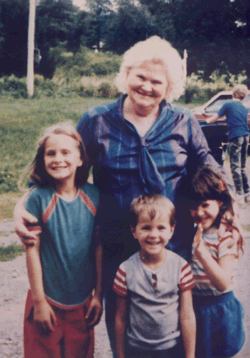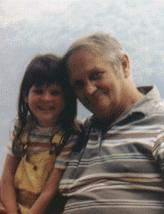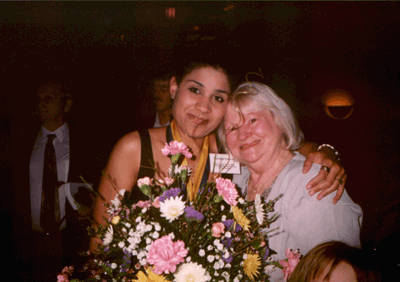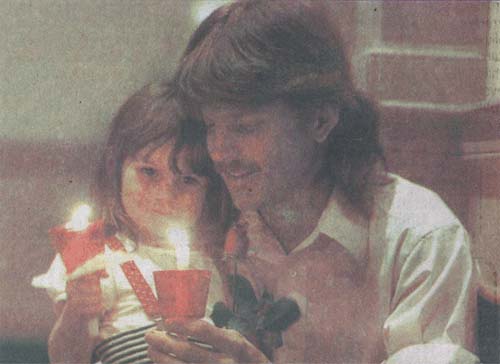Grandparents in Grief
Published in the MADDVOCATE, June 1, 1999
For your own issue of this story, please contact MADD National http://madd.org/ and ask for the June 1, 1999 issue of the MADDVOCATE, the Grandparents Issue.
 Peggy Caldwell-Heichel and her mother, Wanda Chrysler, talk about
the deaths
of Peggy's husband and three children.
(Editor’s note: After Peggy wrote this article she forwarded a copy to her
parents. In some ways their memories of the crash aftermath are quite
different from hers. Peggy’s mother, Wanda Chrysler, shares her memories
also.) Pictured
to the left is Wanda Chrysler with her 3 grandchildren that were killed (from
left to right) Debbie, Jai and Phoebe.
Peggy Caldwell-Heichel and her mother, Wanda Chrysler, talk about
the deaths
of Peggy's husband and three children.
(Editor’s note: After Peggy wrote this article she forwarded a copy to her
parents. In some ways their memories of the crash aftermath are quite
different from hers. Peggy’s mother, Wanda Chrysler, shares her memories
also.) Pictured
to the left is Wanda Chrysler with her 3 grandchildren that were killed (from
left to right) Debbie, Jai and Phoebe.
Peggy: There doesn’t seem to be much information about how drunk driving death and injury affects grandparents. Everyone is
concerned about the parents or the children, but I believe that grandparents should be right at
the top of the list. They may not be living in the same house but they still have a very special attachment to that
grandchild. It’s been said, “Parents
aren’t supposed to bury their children” --even truer, “Grandparents
aren’t supposed to bury their grandchildren.” Since drunk driving kills and injures
so many young people, many grandparents must also deal with this violent crime.
On September 30, 1990, my husband, David Caldwell, and four of our children attended a Christian concert with others from our church where David served
as pastor. I stayed at home with our two youngest children, Kezia, who was two, and Ezekiel who was just nine days old. Little did I know as they left
that night that my life was going to be changed forever because of the irresponsibility of a drunk driver. As my family was returning home from the
concert, a drunk driver hit their car head-on. David and eight-year-old Phoebe died at the crash.
When I arrived at the hospital I was told that my 11-year-old daughter, Debbie, and my son, Jai, who had turned seven the day before, were going to
be air-lifted to other hospitals. Nine-year-old Mary was already at the hospital where they were going to take Debbie; she had been taken by air
ambulance from the crash site. I wasn’t allowed to go with either Debbie or Jai in the helicopters. I was devastated. My husband and one child were dead, my other children were at two different hospitals, each over an hour away
from where I was and at least thirty minutes from each other.
I had to call my parents. It was 1:00 am. and I had to tell them over the phone. My dad answered. “Dad,” my voice was quivering. “Are you all right
honey?” he asked. “David was in a car crash tonight; he and Phoebe are dead.” There was a short pause and my dad replied, “Here’s your mom,”
and he handed her the phone. My mother knew something bad had happened by my dad’s reaction. I told her that David and Phoebe were dead, she asked about
the others and I gave her as much information as I had. I told her, “I’m going to where Jai is because they said he’s the most serious, please meet me there.” I also asked that they call my brothers, call David’s family, and
send someone to be with Debbie and Mary.
Those words will stay with my parents forever. Death notifications aren’t usually made to grandparents unless they are raising the child. When I
realized I needed to let my parents know because I needed their help, no one offered to contact the police or clergy in their town to notify them.
Instead, I had to tell them over the phone in the middle of the night.
Wanda: I think it was 11:00p.m. and we had just gone to sleep when the phone rang. I heard Dad answer and say, “David is dead?” I jumped out of bed and
picked up the phone in the kitchen. I heard you explain that David was dead, you were at the hospital with Debbie and Jai, and you didn’t know where
Phoebe or Mary were. You said there were more dead at the scene but that was all you knew. You also said that they were sending Debbie and Jai to
different hospitals and asked us to go be with Jai while you went to Debbie.
After that, we called your brothers, Chuck, Ric and Tom, and I couldn‘t talk any more. Dad called your sister in California. He also tried to reach
David’s brother, Dick, but got Maude, David’s mother, instead. Dad had to tell her that David was dead.
Our only child still at home, 14-year-old Peter, was asleep in his bedroom.
We called someone to come stay with him, not knowing that we would see very little of him over the next three months.
Peggy: My parents arrived at the hospital before I did. The nurse was getting ready to take them to see Jai when I arrived. Instead of taking us to Jai,
she guided us to a small waiting room. I received a call from the other hospital; Debbie had died in the operating room.
Wanda: Chuck offered to ride to the hospital with your dad and me. Before we could leave, Tom called to tell us that Phoebe was dead too. I thought that 1
would die. I could hardly breathe. Dad drove us to the hospital, crying all the way. I remember making terrible noises trying to breathe; it was so
terrible I didn‘t really think I would survive. I’m not sure how we made it to the hospital. We arrived and at least one of David’s sisters was already
there. We were taken in to see Jai and asked to sign permission papers that would allow them to set his broken arm.
In a short time we heard that you had arrived. We went to be with you and someone else met you at the same time. You were told you had a phone call.
You took the phone and were told that Debbie didn‘t survive the surgery.
Peggy: I remember watching my dad all that day while Jai and Mary clung to life. He was red and just sobbing. Every once in a while he would come over
to me and hug me saying how sorry he was that he couldn’t help me. I was so frightened that he was going to have a heart attack and I’d have to bury my
father too. That afternoon we were told that Jai was brain dead-- there was no brain activity and we couldn’t keep him on life support. We began making
arrangements for organ donation. The next day we moved to the hospital where Mary was, wondering if we were going to lose this child as well.
Wanda: It was an unbelievable nightmare. I lost all track of time. We tried to sleep, went to see Mary, were told that Jai was brain dead and wouldn’t
survive either The first night I fell asleep in a recliner in pediatric ICU next to Mary’s bed. I was holding Zeke who was only ten days old. The nurse
told me the next morning that she was so scared the whole night that I would drop Zeke. They finally found an infant bed for him to sleep in.
Peggy: The pain that grandparents go through is so overwhelming, but so often overlooked. My parents not only suffered through the deaths of three
grandchildren and Mary’s injuries, but they had to watch me in my own grief--and there was nothing they could do to take away my pain.
Wanda: I remember you asking me if Mary was going to be okay and I had no faith left to encourage you with.
Peggy: It’s been almost nine years since my family was killed. My parents have been a great support through my many ups and downs. More than anything else they have helped me survive. But if you mention Phoebe, Debbie, or Jai
or talk about how things used to be, my father will tear up and leave the room. The pain for him will never go away. Mom and Dad’s 23rd grandchild was
born just a few weeks ago and my mother asked me, What do I tell someone when they ask how many grandchildren I have? Do I tell them 23? Or do I tell them
I have 20 living? I don’t want to forget the others--I don’t want anyone forgetting them--they were so special. I want to talk about them but no one
else does--people tell me to get on with my life and enjoy the grandkids I have. I do enjoy them, but I don’t ever want to forget the other three--they
didn’t want to die. Not a day goes by that I don’t think about them and wonder what they would be like now--I know I’ll see them again in heaven--but
it still hurts.” I wasn’t sure what to tell her.
On one wall in their house is a large frame my father made. A special matte
holds a five-by-seven photograph of each of the grandchildren in the order they were born. Every year the pictures get changed and many years a new one is added.
But three pictures always stay the same.
Wanda: I don’t know how to explain how difficult or confusing it is to lose more than one child at a time. By losing them together you feel like it
should be worse but each of the children were so special in themselves. We grieve them individually and collectively.
Peggy: So many people were there for me and concerned about me. The hospital staff offered me the cot in the playroom but my parents had to sleep in the
lobby. I wasn’t working outside the home but my father could only get three days off of his job. He was expected back to work the day after the funeral —
the day after he buried his son-in-law and three grandchildren. Even their friends would ask about me or about Mary--seldom about them.
Wanda: The other immediate memories I have was trying to sleep in one hospital then going to the other hospital. The staff at one hospital tried to
call a local bed and breakfast to see if we could sleep there. The person who answered the phone was very angry because it was the middle of the night. The nurses were very upset by the person‘s reaction but I had no idea of time.
Dad and I tried to sleep in the bench-type seats at the hospital entrance.
This hospital is supposed to have the best trauma unit in the region but they had nothing for the family.
The other hospital had a social worker for us, rooms where we could sleep and shower and a private waiting room with a phone line to call anywhere. The
social worker brought us food and drink and took care of our physical needs.
Peggy: Since I became involved with MADD I have met many other victims and know that there are many grandparents being overlooked. One of my good MADD
friends, Peggie Bouse, experienced the death of one son, Gene, and the injury of another, Derek, in a drunk driving crash. When Peggie’s mom heard the news
about her grandsons, she had a heart attack. Peggie would come home from being with Derek in the burn hospital, wanting nothing more than her mother
to hold her and tell her it was going to be all right, but her mother was hurting so bad that she couldn’t. “You don’t understand,” her mother
told her, “I’m supposed to be able to help you and take away your pain--but I
can’t bear my pain or seeing you in pain.” Six months later, Peggie’s mom
died. I believe she died of a broken heart.
Recently, another advocate and I went to court with a victim family. I was able to spend some time with the grandmother. I asked her if she was doing
okay, she said, “I have to be.” She told me that she felt she had to be strong, her daughter was already dealing with so much that she didn’t think
she could cope with her own mother falling apart. She tried to explain to me how hard it was not only to have lost her grandchild, but also to grieve her
own child’s broken heart. I think I understood some of what she was talking about. In this case, too, the child had great grandparents so there were
three generations of bereaved adults who needed care.
Wanda: I do tell people that I think the hardest of it all was seeing what you had to go through. You expect when your children are growing up that they will have to deal with some difficult things in life. That’s the way life is
and they need to know that things aren’t always wonderful, but NO ONE ever expects to see their child go through something this tragic. I don’t think
anyone can ever imagine that and shouldn’t have to. Life can be tough, but it shouldn’t be that tough. I believe you are doing a great job, honey. I am
very proud of you and love you very much.
Peggy: This year, my daughter Mary, now 18, received the Courage to Comeback, Pittsburgh Penguin Youth Award. In her acceptance speech to 950 people at the
awards ceremony, she thanked God, her mother, and her grandparents. “I want to thank my grandparents, who are here tonight,” she said. “For being there
to help my mom, so she could help me, so I could get to where I am today.” Then she left them with this message. “Don’t drink and drive. That’s why
I’m here tonight; if you choose to drink, please don’t drive.”
|
Phoebe and Grampa Chrysler |
Mary with Gramma Chrysler at the Courage to Comeback dinner |


